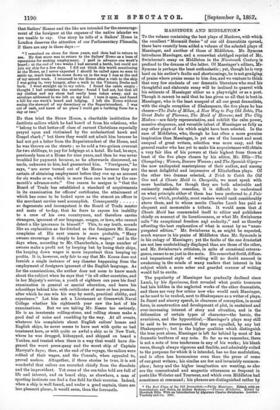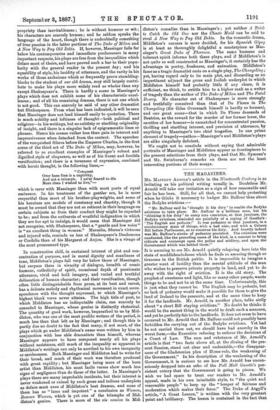MASSINGER AND MIDDLETON.*
To the volume containing the best plays of Marlowe, with whick the excellent "Mermaid Series " of our old dramatists opened, there have recently been added a volume of the selected plays of Messinger, and another of those of Middleton. Mr. Symone introduces Messinger, and a somewhat abridged reprint of Mr. Swinburne's essay on Middleton in the Nineteenth Century is prefixed to the dramas of the latter. Of Messinger's editors, Mr- Symons is perhaps the least enthusiastic ; yet, though he is very hard on his author's faults and shortcomings, he is not grudging, of praise where praise seems to him due, and we venture to think that very few students of our dramatic literature who read his thoughtful and elaborate essay will be inclined to quarrel with his estimate of Maseinger either as a playwright or as a poet. Though it cannot be said that he has given us all that is best in. Messinger, who is the least unequal of all our great dramatists, with the single exception of Shakespeare, the five plays he has chosen—The Duke of Milan, A New Way to Pay Old Debts, The Great Duke of Florence, The Maid of Honour, and The City Madam—are fairly representative, and exhibit the calm power, massive eloquence, and versatile talent of Messinger as fully as any other plays of his which might have been selected. In the case of Middleton, who, though he has often a more genuine inspiration than Messinger, is yet one of the loosest and most unequal of great writers, selection was more easy, and the general reader who has yet to make his acquaintance willobtain a very fair idea of his powers at their highest from three at least of the five plays chosen by his editor, Mr. Ellis—The Changeling ; Women,Bemare Women ; and The Spanish Gipsy— the now undisputed masterpieces of their author, and among the most delightful and impressive of Elizabethan plays. Of the other two dramas selected, A Trick to Catch, the Old One and A Chaste Maid in Cheapeide, we must speak with more hesitation, for though they are both admirable and eminently readable comedies, it is difficult to understand on what principle either of them has been preferred to A Fair Quarrel, which, probably, most readers would rank considerably above them, and to whose merits Charles Lamb has paid so eloquent and memorable a tribute. It would seem that A Chaste Maid has commended itself to editor and publishers chiefly on account of its licentiousness, or what Mr. Swinburne calls "its exceptional freedom and audacity," and as thereby affording the best explanation of what is meant by an "unex- purgated edition." Mr. Swinburne is, as might be expected, much warmer in his praise of Middleton than Mr. Symonds is in his eulogy of Messinger; yet the faults of the one draniatiat are not less unshrinkingly displayed than are those of the other, and Mr. Swinburne'e criticism, in spite of occasional extrava- gance, seems to us just in the main. His somewhat florid, diffuse, and impassioned style of writing will no doubt succeed in awakening in the minds of many readers that interest in his subject which a more sober and guarded manner of writing would fail to excite.
The popularity of Messinger has gradually declined since Lamb, by his Specimens, first revealed what poetic treasures had lain hidden in the neglected works of the other dramatists, and there are very few critics now who would rank Messinger, as he used to be ranked, next to Shakespeare as a writer of plays. In fluent and sinewy speech, in clearness of conception, in moral force, in construction and development of plot, in sustained and ever-increasing interest of story and situation, and in the delineation of certain types of character—the heroic, the avaricious, and the hypocritical,—Massinger's plays may still be said to be unsurpassed, if they are equalled, by any but Shakespeare's ; but in the higher qualities which distinguish the true poet alone, Messinger is left far behind by most of his dramatic brethren of any note. So far as we remember, there is not a note of true tenderness in any of his works; his blank verse, though always vigorous and flexible, and admirably suited to the purposes for which it is intended, has no fine modulation, and is often less harmonious even than the prose of some of our great writers; his similes are few and invariably common- place; fancy and the higher imagination are wanting, as also are the concentrated and magnetic utterances so frequent in poets like Webster and Tonrneur, and which even Middleton had sometimes at command; his phrases are distinguished rather by
• The Best Rags of the OM Dramatists Hemmings!, Edited, with an Introduction and Notes, by Arthur Symoe,.—Thorrm Middleton. Edited by Havelock Ellis. With an Introduction by Algernon Charles Swinburne. Loudon Vizetelly and Co. 1887. propriety than inevitableness; he is without humour or wit ; his characters are scarcely human; and he seldom speaks the language of the heart, though there is undoubtedly something of true passion in the latter portions of The Duke of Milan and A New Way to Pay Old Debts. If, however, Messinger falls far below his contemporaries and immediate predecessors in many important respects, his plays are free from the inequalities which deface most of theirs, and have proved such a bar to their popu- larity with the general reader in the present day ; and his equability of style, his lucidity of utterance, and the rarity in his works of those archaisms which so frequently prove stumbling. blocks to the student of our old drama, may still largely contri- bute to snake his plays more widely read as wholes than any except Shakespeare's. There is hardly a scene in Massinger's plays which does not exhibit some of his characteristic excel- lences ; and of all his remaining dramas, there is not one which is not good. This can scarcely be said of any other dramatist but Shakespeare. From what has been indicated, it will be seen that Messinger does not lend himself easily to quotation. There is much nobility and loftiness of thought—both political and religions—in hie writings, but no subtlety or startling originality of insight, and there is a singular lack of epigrammatic lines or phrases. Hence his scenes rather lose than gain in interest and impressiveness when detached from the context. The speeches of the vanquished Sforza before the Emperor Charles, in the first scene of the third act of The Duke of Milan, may, however, be referred to as excellent examples of Massinger's robust and dignified style of eloquence, as well as of his fluent and forcible versification; and there is a terseness of expression, combined with heroic thought, in the following lines,— " Conquest
Over base foes is a captivity, And not a trinmph. I ne'er feared to die
More than I wished to live,"— which is rarer with Messinger than with most poets of equal eminence. In his treatment of the gentler sex, he is more respectful than most of his brother-playwrights, and some of his heroines are models of constancy and chastity, though it must be owned that they are not so reticent in their language on certain subjects as front their conduct they might be expected to be ; and from the outbursts of wrathful indignation in which they are too apt to indulge, it would seem that Messinger did not recognise, with Shakespeare, that a "gentle and low voice" is "an excellent thing in woman." Marcella, Sforza's virtuous and injured wife, reminds 1113 less of Shakespeare's Desdemona or Cordelia than of his Margaret of Anjou. She is a virago of the most pronounced type.
In constructive skill, in sustained interest of plot and con- centration of purpose, and in moral dignity and manliness of tone, Middleton's plays fall very far below those of Messinger, but surpass them in vivacity of dialogue, breadth of comic humour, catholicity of spirit, occasional depth of passionate utterance, vivid and bold imagery, and varied and truthful delineation of human character ; and their versification, though often little distinguishable from prose, at its best and rarest, has a delicate melody and rhythmical movement in exact corre- spondence with the thought expressed, to which Massinger's highest blank verse never attains. The high title of poet, to which Middleton has an indisputable claim, can scarcely be conceded to Maesinger, whose genius is distinctly rhetorical. The quantity of good work, however, bequeathed to us by Mid- dleton, who was one of the most prolific writers of the period, is much less than that left as by Messinger; and though this is partly due no doubt to the fact that many, if not moat, of the plays which go under Middleton's name were written by him in conjunction with less able dramatists than himself, whereas Messinger appears to have composed nearly all his plays without assistance, still much of the inequality so apparent in Middleton's writings can only be ascribed to his own incapacity or carelessness. Both Messinger and Middleton had, to write for their bread, and mach of their work was therefore produced with great rapidity ; but Messinger being more of the born artist than Middleton, his most facile verses show much less signs of negligence than do those of the latter. In Massinger's plays there are many improbable incidents, but their interest is never weakened or ruined by such gross and tedious underplots as deface most even of Middleton's best dramas, and none of them has so "lame and impotent" a conclusion as Women, Beware Women, which is yet one of the triumphs of Mid- dleton's genius. There is more of the via comica in Mid-
dleton's comedies than in Massinger's ; yet neither A Trick to Catch the Old One nor the Chaste Maid can be said to rival A New Way to Pay Old Debts. In the romantic drama, Middleton's success is more decided, for his Spanish Gipsy is at least as thoroughly delightful a masterpiece as Maii- singer's Great Duke of Florence. The same humane and tolerant spirit informs both these plays, and if Middleton's is not quite so well constructed as Massinger's, it certainly has the advantage in poetry, freshness, and animation. Middleton's fame as a tragic dramatist rests on a single play, The Changeling ; yet, having regard only to its main plot, and discarding as an impertinent adjunct the gross and foolish underplot in which Middleton himself had probably little if any share, it is sufficient, we think, to entitle him to a higher rank as a writer of tragedy than the author of The Duke of Milan and The Fatal Dowry. No character out of Shakespeare is more strongly and truthfully conceived than that of De Flores in The Changeling (Sir Giles Overreach himself is hardly so human), and one great scene—that in which Be Flores demands of Beatrice, as the reward for the murder of her former lover, the sacrifice of her honour—is unmatched for concentrated passion, thrilling and startling interest, and precision of utterance, by anything in Massinger's two chief tragedies. In one prime element of tragedy—pathos—Massinger's and Middleton's plays are alike singularly deficient.
We ought not to conclude without saying that admirable portraits of Messinger and Middleton appear as frontispieces to the present selections from their plays, and that Mr. Symons's and Mr. Swinbarne's remarks on them are not the least interesting portions of their essays.



































 Previous page
Previous page